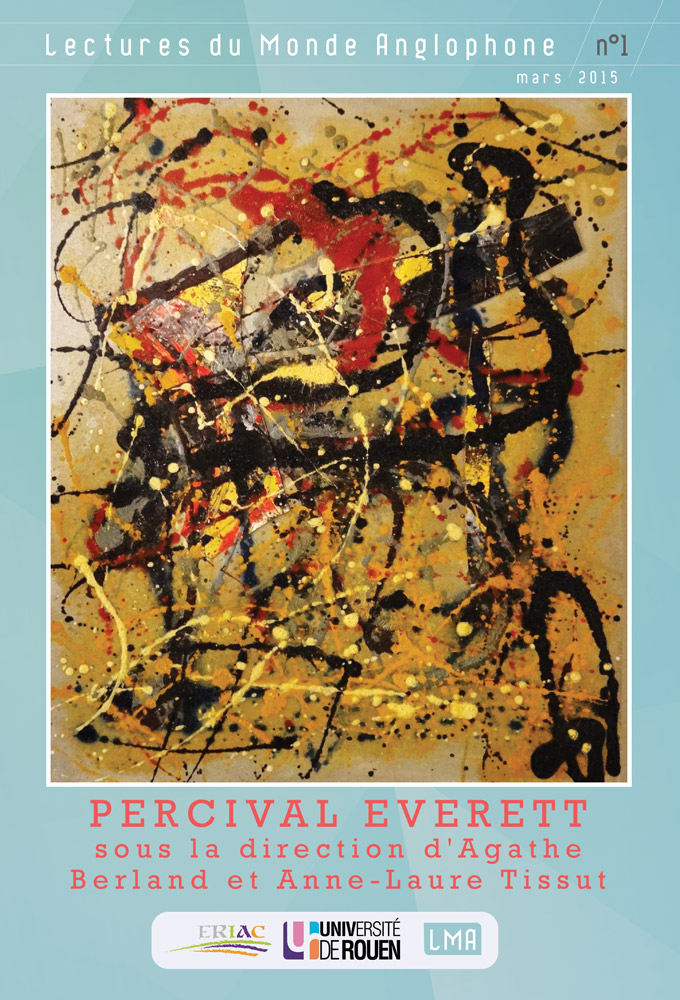Sommaire
1 | 2015
Percival Everett
Ce volume recueille les communications présentées lors du colloque international « Percival Everett » organisé par l’équipe, à l’initiative d’Agathe Berland et d’Anne-Laure Tissut, en mars 2013 à la Maison de l’Université de Mont-Saint-Aignan.Textes recueillis par Agathe Berland et Anne-Laure Tissut, et mis en forme par Sarah Boulet. This volume gathers the papers given at the international conference “Percival Everett” organised by the ERIAC research center and managed by Agathe Berland and Anne-Laure Tissut, that took place in March 2013 at the Maison de l’Université in Mont-Saint-Aignan.Texts collected by Agathe Berland and Anne-Laure Tissut, and finalized for publication by Sarah Boulet.

- Anne-Laure Tissut Introduction
- Keith B. Mitchell Encountering the Face of the Other: Levinasian Ethics and Its Limits in Percival Everett’s God’s Country
- Marguerite Déon Clichés and cultural icons in Percival Everett’s fiction
- Anthony Stewart Talking About Race, Exposing The Desire for the Post-Racial, and Percival Everett’s Assumption
- Claude Julien Assumption: from reminiscences to surprise, from dream to nightmare
- Isabelle Van Peteghem-Tréard Jouissance in Damnedifido stories by Percival Everett
- Clément-Alexandre Ulff Invisible Fathers: Investigating Percival Everett’s “Lower Fresquencies”
- Michel Feith The Well-Tempered Anachronism, Or The C(o)urse of Empire in Percival Everett’s For Her Dark Skin
- Judith Roof Everett’s Eidolon: The Story of an Eye
- Brigitte Félix “Of weeds and words: Percival Everett’s poetry”
- Claudine Raynaud Naming, Not Naming and Nonsense in I am Not Sidney Poitier
- Françoise Sammarcelli Vision and Revision in Percival Everett’s Erasure
- Marie-Agnès Gay "Wanted: straight words" in Percival Everett’s novel Wounded
- Sylvie Bauer “Private Terbulent Seas”: “painting The Moon” In Cutting Lisa, By Percival Everett
- Gwen Le Cor “At any rake,” angles of “linguistic condensation” and shock in Percival Everett’s The Water Cure: “All this while we play and pain with a language that is private.”
1 | 2015
Vision and Revision in Percival Everett’s Erasure
Françoise Sammarcelli
Erasure (2001) is a highly reflexive novel in which Percival Everett engages in an ironical dialogue with literary and artistic traditions–a dialogue which a number of mock-philosophical conversations between famous artists (such as Rothko and Motherwell, Rauschenberg and De Kooning, etc) cleverly dramatize. Playing with a dynamic of revision on several intertextual and intersemiotic levels, the text denounces the conventions of representation (including representations of “black” identity) and addresses the ambiguous issue of political correctness. Rather than dwelling on the status of the richly parodic and already much-commented embedded fiction “My Pafology”, this paper will focus on the fragmentary quality of Ellison’s journal and its questioning of Western culture. What is it that we remember or forget? How do we make sense of our experience? It is worth examining how this brilliant novel compels its reader to change perspective and revise some of his/her interpretive strategies.
Ce texte n’a pas encore fait l’objet d’une rétroconversion en XML, mais il peut être consulté dans sa version PDF.

Ce(tte) œuvre est mise à disposition selon les termes de la Licence Creative Commons Attribution - Pas dUtilisation Commerciale - Partage dans les Mêmes Conditions 4.0 International. Polygraphiques - Collection numérique de l'ERIAC EA 4705
URL : https://publis-shs.univ-rouen.fr/eriac/529.html.
Quelques mots à propos de : Françoise Sammarcelli
Université Paris Sorbonne
A former student at the ENS Fontenay-St Cloud, Françoise Sammarcelli is a Professor of American Literature at the Sorbonne University in Paris where she is the head of the Research Center on Texts and Images. She is the author of a book on John Barth as well as of many papers on issues of representation, on intertextuality as well as on intersemiotic relations. She recently edited two publications, Image et mémoire (PU Paris Sorbonne, 2009) and L’Obscur (Michel Houdiard, 2009).
